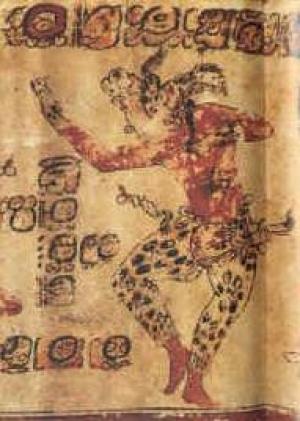When we are calling the days during a fire ceremony, Ajmak is often referred to as the nawal of redemption, and I feel this is a key element to the energy of this particular day. It is a day to both redeem others and seek our redemption.
An interpretation of the number 10 is that of community. When we combine this with the energy of the nawal Ajmak, we can see two very important ideas emerging. One is asking forgiveness from your community. Occasionally we make a mistake which can impact on our community or our peer group. Our instinct may be to try to cover this up, to paper over the cracks without actually addressing the issue. However, at some level this issue may be still bubbling away beneath the surface, causing disharmony. Often the thought of addressing the issue, of bringing it up for resolution is more intimidating than the actual process itself. The energy of the day 10 Ajmak provides beneficial conditions for going through such a process of redemption within your community.
The other side of 10 Ajmak is about our own ability to forgive society. There is much discontent within society at this present time. Issues have divided communities and families, driving wedges between friends. The disharmony created by this is perceptible, even behind the smiles. This is the day to fix these situations within yourself and forgive your perceived failings of society. It is not possible to come to equilibrium through enmity, only side by side can we work together to resolve the situation for the good of all. To initiate this process, forgiveness must take place, and the energy of the day 10 Ajmak creates the perfect environment to do that. Only then will we truly bring the sweetness back into our society.
The number 10 gives us the sense of the two hands coming together, of cooperation and support. When we combine this with the energy of Ajmak, it could be seen as extending a hand to help those who have fallen get back up again. By choosing to take this action, we start to release our own karmic burden. It is a day of asking forgiveness from our community for the times when we might have acted with less integrity that we normally would. The action of assisting those in need may certainly help to restore our balance.
Therefore, today even more than others, if you get the opportunity to act selflessly to help others, grab it with both hands. You have been handed a gift, the key to your own redemption.
I am sorry
Please forgive me
I love you
Thank you
When the creators fashioned the four first men, the Bacab’ob, they created them as equals. These four first humans had superhuman abilities, including the ability to see through space and time. As equals were not desired, the gods smoked the mirror of perception, giving us our human set of senses. When we lost the ability to see through time, we lost the ability to see the true consequences of our actions and thus we needed to start asking for forgiveness. Sometimes even well meaning actions can cause problems at a later date. Ajmak represents this ability to forgive others, the ability to forgive ourselves and the ability to accept forgiveness.
Ajmak is a sensual energy, which creates some of the reasons for its needing to be forgiven. It is kind and very lovable, but irresponsible. It can be a very talented energy, with great ideas. However it can also be very easily distracted, especially by anything that makes it feel nice. This often leads Ajmak to failing to fulfil its true potential, although due to its lovable nature it is easy to forgive. One of the lessons with regards to the Ajmak energy is learning to forgive oneself.
The number 10 is another number which demonstrates the connection between the sacred calendar and the human body. As five represents one hand, ten represents two hands coming together. This can be seen as the shaking of hands creating agreement between people. Ten is seen as a good number, a number of community and the laws of society, of people acting in harmony with each other.



































